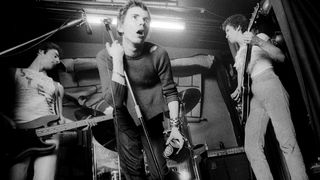Our Greatest Albums Of The 70s, numbers 9 to 6.
9) SPUNK – Sex Pistols (Blank, 1977)
Never Mind The Bollocks was a massively reworked and refined Chris Thomas-produced caricature of the Pistols’ sound. Steve Jones’s brutal guitar riffs were stripped to their essence, multi-tracked into an impenetrable wall of sound and, with the sole exception of Bodies (iconic non-savant idiot Sid Vicious’s only appearance on Bollocks), further bolstered by Jones’s own emphatically primitive root-note bass runs.
Spunk, meanwhile, caught the band at their free-range, organic best. Recorded with Dave Goodman over the course of three sessions between July ’76 and January ’77, it captured the Sex Pistols as they sounded on the nights that they inspired The Clash, Damned, Banshees et al into existence: simple, uncontrived, doldrums-driven aggression with its intrinsic melodic sensibilities underlined by the fluid harmonic bass runs of Glen Matlock, the man who put them there in the first place. Released a month before Bollocks, most probably by manager Malcolm McLaren himself (who not only preferred the sound of these sessions, but also – as ever – ‘needed’ the cash), Spunk may not have boasted the pendulous, epoch-defining cojones of Bollocks, but it provided a superior showcase for the pure power-pop genius of the Pistols’ compositions.
What they said at the time: “An album no self-respecting rock fan would turn his nose up at. I’ve been playing it constantly for a week and I’m not bored yet.” Sounds
8) A FAREWELL TO KINGS – Rush (Mercury, 1977)
In the summer of 1977 there was anarchy in the UK. But in a remote part of Wales, three long-haired, pot-smoking Canadian dudes remained unaffected by all the hullabaloo about punk rock. Recording for the first time outside of Canada – at Rockfield studios in Monmouthshire – Rush created in their fifth album, A Farewell To Kings, a masterpiece of virtuoso progressive heavy rock. The album was dominated by two epic tracks running to more than 10 minutes: Xanadu, based on the 18th-century poem Kubla Khan by Samuel Taylor Coleridge; and the fantastically titled space-rock odyssey Cygnus X-1 Book I: The Voyage. There were shorter songs too, including the beautiful, uplifting Closer To The Heart, which became an anthem for the band. But the track that defined the album was Xanadu – vast, complex, and richly atmospheric. A Farewell To Kings was the antithesis of punk, save for one small detail: in its title track, drummer/lyricist Neil Peart wrote of ‘Ancient nobles showering their bitterness on youth’. In this was an echo of the most infamous song of 1977 – the Sex Pistols’ mutinous God Save The Queen.
What they said at the time: “A triumph. A total, out-and-out, honest-to-God, five star studded, complete, utter, unmitigated triumph.” Sounds
7) SOME GIRLS – The Rolling Stones (Rolling Stones, 1978)
There was a certain irony, a wry self-awareness, in the title of a Stones compilation released in 1981: Sucking In The Seventies. Although the band had begun that decade with two classic albums – Sticky Fingers and Exile On Main St – the broad consensus was that the Stones had sleepwalked from Goats Head Soup in ’73 to Black And Blue in ’76. It was only with their last album of that decade, Some Girls, that they reclaimed their reputation as The World’s Greatest Rock’N’Roll Band.
With Keith Richards partly distracted by the threat of jail following his drug bust in ’77, it was Mick Jagger who took the lead on Some Girls. “Punk and disco were going on at the same time,” Jagger said, and these became key influences for the Stones – on fast, spiky rock’n’roll numbers such as Respectable, and the funky, hypnotic hit single Miss You. Jagger never sang with more soul than on Beast Of Burden, and never shocked more than when he sneered on the title track: ‘Black girls just wanna get fucked all night.’ Mick had saved the Stones – a tough one for Keith to swallow.
What they said at the time: __ “What makes Some Girls more than just-another-duff-Stones-album is the creative revitalisation of Mick Jagger.” __ NME
6) MEDDLE – Pink Floyd (Harvest, 1971)
Having resolved the creative impasse that led to Ron Geesin’s input on the band’s 1970 album Atom Heart Mother, Pink Floyd set about its follow-up with renewed vigour. The resulting Meddle struck a balance between the whimsical art-pop of Floyd’s earliest days and the proggier, more experimental nature of their post-Syd era. Acoustic ballad A Pillow Of Winds and the shuffling jazz of San Tropez were thus fairly conventional next to the 23-minute monster that was Echoes. Taking up an entire side of vinyl, it was a logical extension of Floyd’s previous album, replete with accidental sound effects, improvised passages, choral echo and a scintillating guitar solo from David Gilmour – not to mention keyboard player Richard Wright’s depth-charge ‘ping’. Another standout was the dust-devil rock of One Of These Days, featuring a curious spoken line by drummer Nick Mason.
Meddle fared well in the UK, although lax publicity in the States meant that it failed to become a hit there. Nevertheless, its artistic vision cleared the path for the truly sensational success of the album Pink Floyd recorded next: The Dark Side Of The Moon.
What they said at the time: “Confirms lead guitarist David Gilmour’s emergence as a real shaping force with the group… killer Floyd from start to finish.” Rolling Stone

